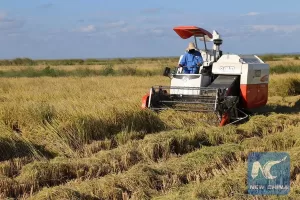Cameroon farmers are prepared to continue smuggling their produce to Nigeria even in the face of the crop export ban by the Cameroonian government.

Farmers in Cameroon have kicked against the recent ban imposed by the Cameroonian government on cash crops exported to Nigeria.
The struggling farmers who prefer to sell their goods to Nigeria are protesting the ban, saying it’s more profitable and safer to sell their goods to Nigeria.
Read Also: Cashless Policy: Where Did Our ₦50bn Go? Poultry Farmers Ask
According to the farmers, the ban will be hard to enforce along the porous, 2,000-kilometer-long border.
Cameroon’s Ministry of Trade had on June 13, 2023, imposed a temporary ban on all cash crops exported to Nigeria.
While explaining, the Ministry of Trade said the ban was needed to curb revenue loss of about $165 million arising from smuggling cash crops to Nigeria – 60% of the total trade.
The temporal ban affects the legal and illegal trade of cash crops such as cocoa, cotton, and other cash crops in Nigeria by Cameroonian farmers.
Cameroon police and customs officials say they blocked scores of trucks that attempted to smuggle cash crops from northern towns and villages in Nigeria in the past two weeks.
Farmers Make Huge Benefits Selling To Nigeria
Reacting to the development, the spokesperson of the Association of Cereal Farmers on Cameroon’s northern border with Nigeria, Baba Ahmadou said “Many farmers are not able to store their crops for selling in Cameroon.”
Explaining further, Ahmadou said Cameroon does not have enough facilities to protect cocoa, wheat, corn, rice, and sorghum from moisture, dust, and [insect] swarms that invade and destroy crops after harvest.
He says farmers prefer selling their produce to a ready Nigerian market because rice, corn, and raw cotton processing equipment are scarce and old, and there are regular power cuts.
Read Also: Climate Change: Adopt Agric Insurance Policy, IFAD Tells Farmers
Ahmadou says selling to Nigerian merchants is also more profitable, and he cites the example that farmers can get about 20% more for a 50-kilogram bag of unprocessed rice
The farmers have however said that smuggling to Nigeria will continue as long as their options are selling at lower prices at home or risking illegal exports across the porous border.
As the price of food keeps going higher and higher by the day, Nigerians have been advised to seek an extra source of income in order to make ends meet.
You might want to watch the video below to learn how to start an aso oke and adire business





